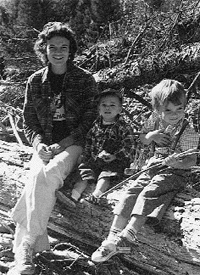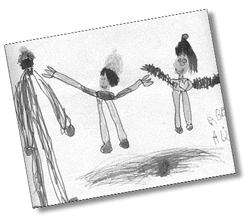THE PARENT DANCE
by Kate Gadbow

A younger Kate Gadbow and her two children, Ali, three, and Grady, five.
When I think of parenting I tend to picture hands. I think many of us do, because they’re embedded in the language of parenting: I can’t handle this child; I favor a hands-on approach. But my image of parenting is a particular one: two hands, palms spread wide, the child between, but not held by, those outstretched palms. This palms-out, ready-but-not-touching gesture is the one parents naturally assume when their children take their first steps.
I like to think my images are original, but it’s possible I stole them from the popular songs that rattle around in my brain, especially those involving paradoxes. You remember the old Linda Ronstadt tune: “Love is a rose and you’d better not pick it, only grows when it’s on the vine.” Or the more recent Paul Simon lyric about “the open palm of desire...The strength to let you go.” I think both songs refer to romantic love, but it seems to me they could apply to parental love as well. I know my biggest screw-ups as a parent have occurred when I could no longer keep those guiding hands open. Instead, I clenched. I stopped trusting myself, or the child, and tried to force something that could never work.
I wasn’t always so humble. Had somebody asked me to write about parenting when my first child was six months old, it would have been a snap because I knew everything. I had this cheerful, easy-going baby boy who always slept through the night. The reason he was such a jewel, I was certain, was that I was a perfect parent. I was so sure of this, in fact, that I never hesitated to dispense advice to others, especially to the seemingly clueless parents of unruly two-year-olds.
Two years later, when that first child regularly escaped into the street and his infant sister had yet to give us a good night’s sleep, I developed a few doubts. This summer, my son turned twenty-one, and I’m not sure I know much at all. My children have grown into beautiful, interesting young adults, but-and I’m not trying to be coy -I’m honestly not sure how they got that way. Was it because of me and my husband, or in spite of us? The only thing I know is that parenting is a complicated dance, done in the dark.
These days, for us, that daily dance is over. What used to be constant negotiations-the car, the curfews-have evolved into occasional conversations, ranging from the mundane to the philosophical. In that elevated region, the talk seems to revolve around such questions as: How do you know what you should study? How do you keep creativity alive? How do you take healthy risks-in your work, in your life-when the odds are stacked against you and the rewards unsure?

Drawing by Ali Gadbow at age four.
These are the kinds of questions I discuss with the graduate students I advise, who have left comfortable careers to push against the difficult crafts of poetry and fiction in a world that places increasingly less value on either. But my children too, whose inclinations lie in the arts, are trying hard to figure out how to pursue what they love while finding ways to support themselves.
With both my children and graduate students, I try to give “I messages.” I tell them all I know is that I have found in my own life that-regardless of the outcome or reward-I am most happy and fully alive when I’m creating something. In most cases that is a piece of writing, but there have been other things as well-a solution to a problem, a garden, an especially tricky dessert. But in order to create, you have to trust yourself enough to head out into unknown territory. And to do that, you have to believe in yourself, and in life.
So if there’s any advice I now feel I can give other parents, it is that our main job is to help children believe in themselves in an increasingly complex and often frightening world. As most parents know, this requires unconditional love and strategic support-different kinds at different times. But it also involves a third element, one I was lucky enough to get from my own amazing parents and have been taught-sometimes the hard way-by my children: the ability to see, really see, our children as unique people and to acknowledge that from the time they get their little feet under them and start dashing for the street, they are themselves-not reflections on, extensions of or validations of their parents.
And with that I guess I’m back to the pop songs. As Linda Ronstadt told us years ago: “Lose your love when you say the word mine.” M
Kate Gadbow ‘74, M.F.A. ‘86, directs UM ‘s creative writing program.
![]()